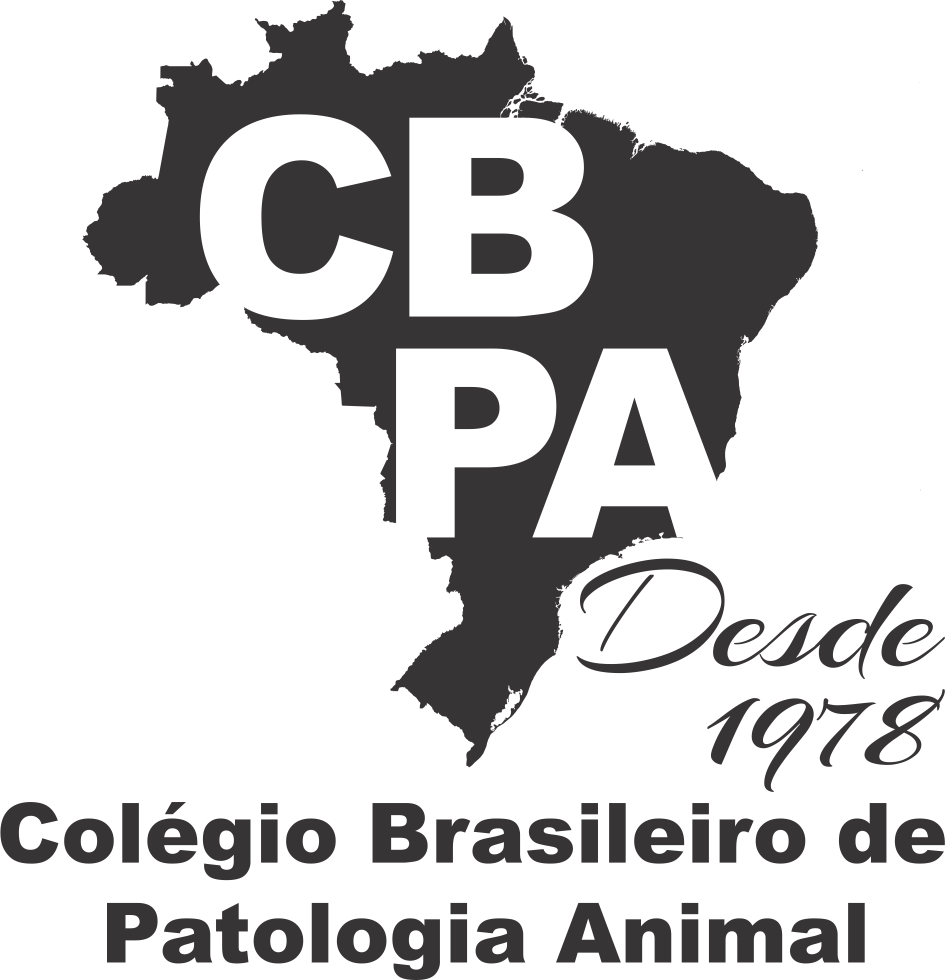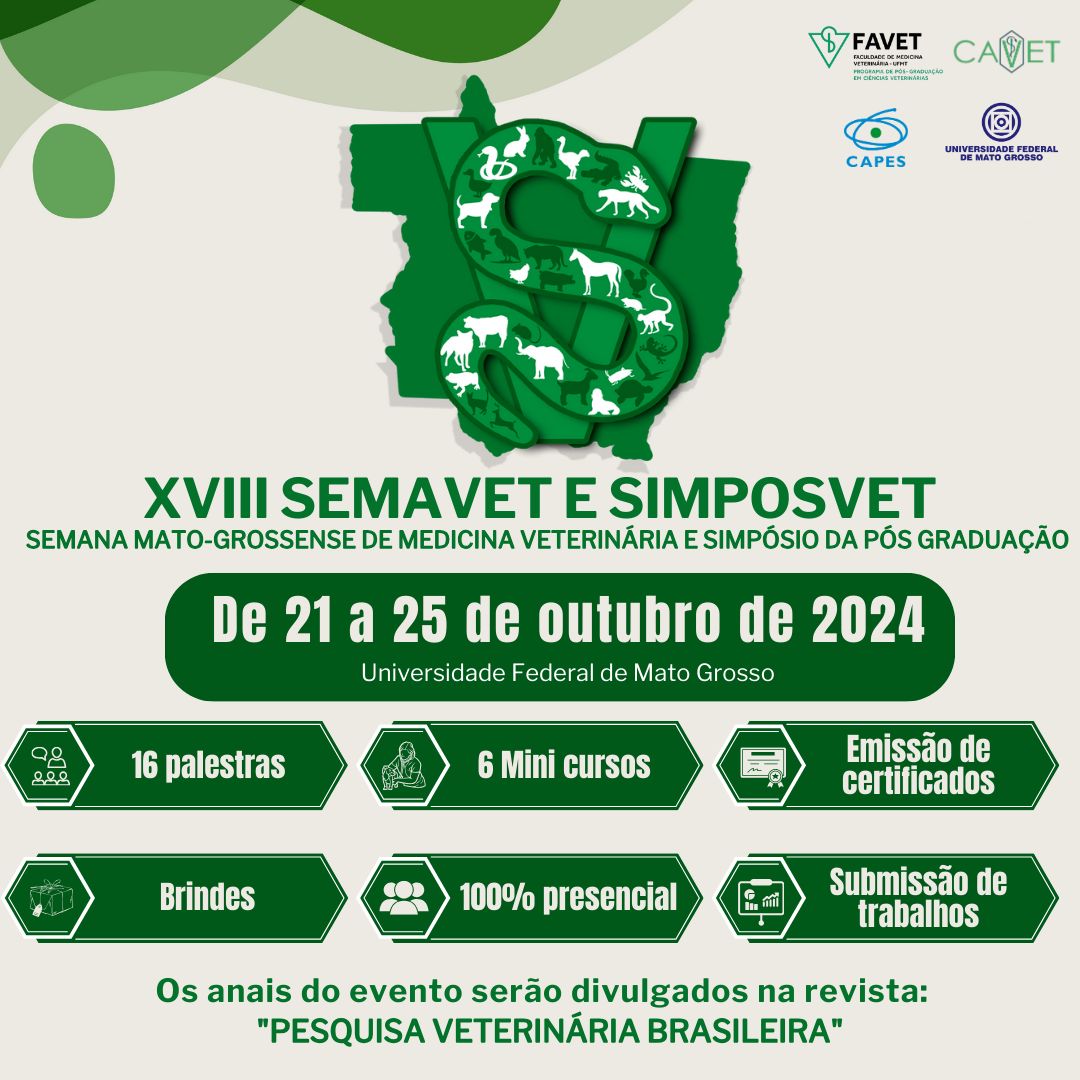Resultado da pesquisa (2)
Termo utilizado na pesquisa cranial nerves
#1 - Increased frequency of pneumonia in dogs with meningioma in ventral rhombencephalon
Abstract in English:
Intracranial tumors occurring in specific brain regions, such as the cerebellopontine angle, may be associated with cranial nerve dysfunction and dysphagia in humans and animals. Although dysphagia is a known risk factor for pneumonia, only postoperative pneumonia has been investigated in veterinary medicine. This study aimed to describe the clinical and pathological features of dogs with untreated intracranial meningiomas and concomitant pneumonia. Data from post-mortem examination registries from 2011 to 2021 were used (n=23). The frequency of pneumonia and other characteristics were compared between dogs with meningiomas in the ventral rhombencephalon region (VR group; n=13) and those with meningiomas in other intracranial sites (OIS group; n=10). The frequency of pneumonia was higher in the VR group than in the OIS group (n=5 vs. n=0; P=0.039). Plaque-like lesions were also more common in the VR group than in the OIS group (P=0.012). Dogs with concomitant pneumonia had cerebellopontine angle (n=3) and basilar meningiomas (n=2), mainly plaque-like lesions extending to or from other brain areas. In dogs with concomitant pneumonia, meningiomas had invasive (n=5) and compressive (n=3) growth behaviors and nerve roots involved in the swallowing process were frequently affected. Microscopically, these meningiomas were classified as atypical (n=4) and meningiomas (n=1). The reported clinical signs included anorexia (n=3), adipsia (n=1), and dysphagia (n=1). Our findings suggest untreated dogs with ventral rhombencephalon meningiomas may develop cranial nerve damage and aspiration pneumonia.
Abstract in Portuguese:
Tumores intracranianos que ocorrem em regiões específicas do cérebro, como o ângulo ponto-cerebelar, podem estar associados à disfunção de nervos cranianos e disfagia em humanos e animais. Embora a disfagia seja um conhecido fator de risco para pneumonia, apenas a pneumonia pós-operatória tem sido investigada na medicina veterinária. Este estudo teve como objetivo descrever as características clínicas e patológicas de cães com meningiomas intracranianos não tratados e pneumonia concomitante. Foram utilizados dados de registros de necropsias de 2011 a 2021. A frequência de pneumonia e outras características foram comparadas entre cães com meningiomas na região do rombencéfalo ventral (grupo VR; n=13) e aqueles com meningiomas em outros sítios intracranianos (grupo OIS; n=10). A frequência de pneumonia foi maior no grupo VR do que no grupo OIS (n=5 vs. n=0; P=0,039). Lesões tipo placa também foram mais comuns no grupo VR do que no grupo OIS (P=0,012). Cães com pneumonia concomitante apresentaram meningiomas no ângulo ponto-cerebelar (n=3) e região basilar (n=2), predominantemente lesões em forma de placa que se estendem de ou para outras áreas do cérebro. Em cães com pneumonia concomitante, os meningiomas apresentaram comportamentos de crescimento invasivo (n=5) e compressivo (n=3) e as raízes nervosas envolvidas no processo de deglutição foram frequentemente afetadas. Microscopicamente, esses meningiomas foram classificados como atípicos (n=4) e papilar (n=1). Os sinais clínicos relatados incluíram anorexia (n=3), adipsia (n=1) e disfagia (n=1). Nossos achados sugerem que cães com meningiomas no rombencéfalo ventral, não tratados, podem desenvolver lesão em nervos cranianos e pneumonia aspirativa.
#2 - Intoxicação espontânea por vagens de Prosopis juliflora (Leg. Mimosoideae) em bovinos em Pernambuco, p.233-240
Abstract in English:
ABSTRACT.- Câmara A.C.L., Costa N.A., Riet-Correa F., Afonso J.A.B., Dantas A.F.M., Mendonça C.L. & Souza M.I. 2009. [Spontaneous poisoning in cattle by mesquite beans, Prosopis juliflora (Leg. Mimosoideae) in Pernambuco.] Intoxicação espontânea por vagens de Prosopis juliflora (Leg. Mimosoideae) em bovinos em Pernambuco. Pesquisa Veterinária Brasileira 29(3):233-240. Clínica de Bovinos, Campus Garanhuns, Universidade Federal Rural de Pernambuco, Av. Bom Pastor s/n, Cx. Postal 152, Mundaú, Garanhuns, PE 55292-901, Brazil. E-mail: aclcamara@yahoo.com.br
Three outbreaks of poisoning by Prosopis juliflora pods are reported in the semiarid region of the state of Pernambuco, Northeastern Brazil, in cattle grazing in fields invaded by the plant or ingesting mesquite beans as a concentrate food. In two farms the disease occurred sporadically. In another, 112 (9.28%) cattle out of 1206 were affected, 84 (6.96%) died due to emaciation, and 28 (2.32%) gained weight after the pods had been withdrawn from the feed. Main clinical signs were progressive weight loss, atrophy of the masseter muscles, dropped jaw, tongue protrusion, difficulties in prehending food, tilting the head during mastigation or rumination, salivation, impaired swallowing, and decreased tone of the tongue. The hematology reveals hypoproteinemia and anemia. Gross lesions were emaciation and reduction in size of the masseter muscles, which appear thinner than normal and grayish due muscular atrophy. Degeneration of neurons of the trigeminal motor nuclei, Wallerian degeneration of the trigeminal nerve roots, and muscular atrophy of the masseter muscles with substitution by fibrous tissue were observed on histologic examination. For the prevention of the poisoning is necessary to limit the amount of mesquite beans in animal nutrition. It is also necessary to develop research to determine the economic and sustainability of the use of Prosopis juliflora for animal food, human food or other uses such as charcoal, wood and fuel wood.
Abstract in Portuguese:
ABSTRACT.- Câmara A.C.L., Costa N.A., Riet-Correa F., Afonso J.A.B., Dantas A.F.M., Mendonça C.L. & Souza M.I. 2009. [Spontaneous poisoning in cattle by mesquite beans, Prosopis juliflora (Leg. Mimosoideae) in Pernambuco.] Intoxicação espontânea por vagens de Prosopis juliflora (Leg. Mimosoideae) em bovinos em Pernambuco. Pesquisa Veterinária Brasileira 29(3):233-240. Clínica de Bovinos, Campus Garanhuns, Universidade Federal Rural de Pernambuco, Av. Bom Pastor s/n, Cx. Postal 152, Mundaú, Garanhuns, PE 55292-901, Brazil. E-mail: aclcamara@yahoo.com.br
Three outbreaks of poisoning by Prosopis juliflora pods are reported in the semiarid region of the state of Pernambuco, Northeastern Brazil, in cattle grazing in fields invaded by the plant or ingesting mesquite beans as a concentrate food. In two farms the disease occurred sporadically. In another, 112 (9.28%) cattle out of 1206 were affected, 84 (6.96%) died due to emaciation, and 28 (2.32%) gained weight after the pods had been withdrawn from the feed. Main clinical signs were progressive weight loss, atrophy of the masseter muscles, dropped jaw, tongue protrusion, difficulties in prehending food, tilting the head during mastigation or rumination, salivation, impaired swallowing, and decreased tone of the tongue. The hematology reveals hypoproteinemia and anemia. Gross lesions were emaciation and reduction in size of the masseter muscles, which appear thinner than normal and grayish due muscular atrophy. Degeneration of neurons of the trigeminal motor nuclei, Wallerian degeneration of the trigeminal nerve roots, and muscular atrophy of the masseter muscles with substitution by fibrous tissue were observed on histologic examination. For the prevention of the poisoning is necessary to limit the amount of mesquite beans in animal nutrition. It is also necessary to develop research to determine the economic and sustainability of the use of Prosopis juliflora for animal food, human food or other uses such as charcoal, wood and fuel wood.











